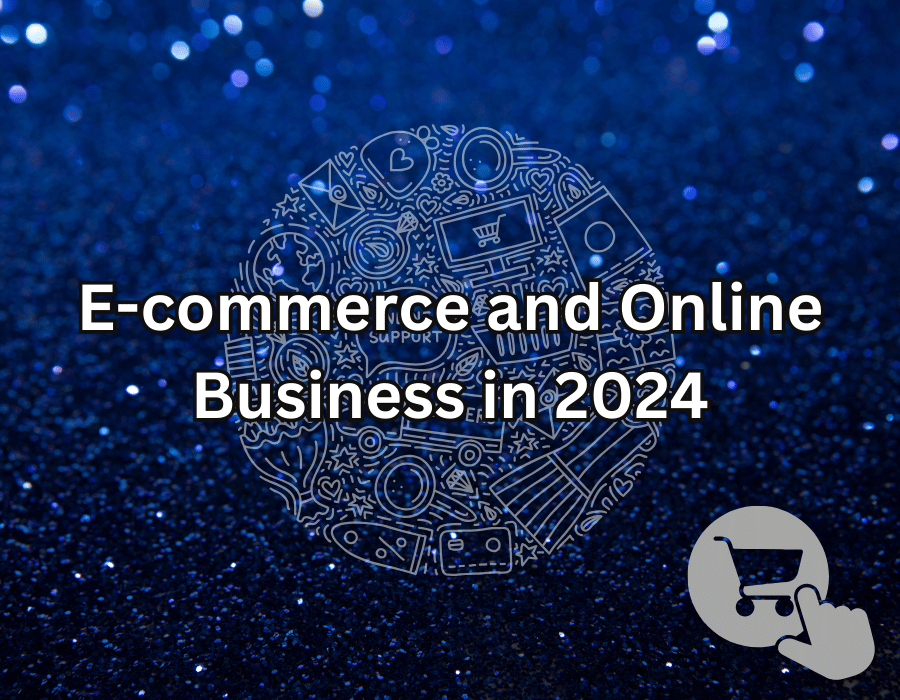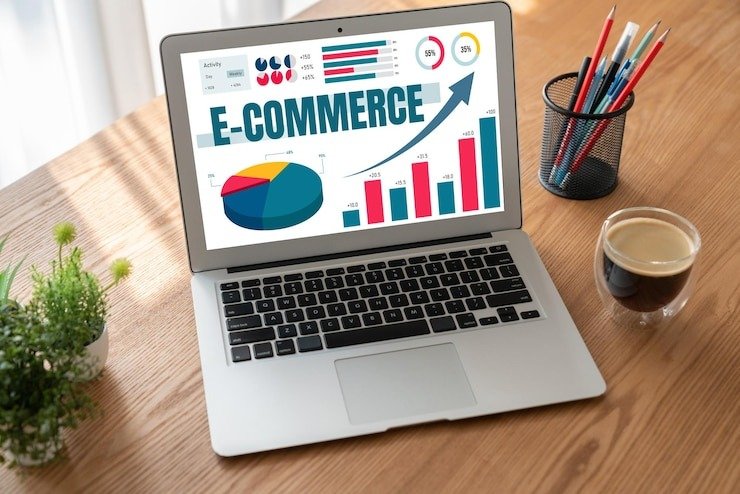
E-commerce and Online Business in 2024: A Comprehensive Guide
E-commerce and Online Business in 2024: A Comprehensive Guide
The world of e-commerce is growing rapidly, and in 2024, the industry is set to continue its rise as more entrepreneurs start ecommerce businesses to Auction products and services online. Whether you’re starting a small business, launching a new online store, or expanding into global markets, understanding the dynamics of ecommerce business is essential for success.
What is E-commerce?
E-commerce refers to the buying and selling of goods or services through the internet. It encompasses various business models such as business-to-consumer (B2C), business-to-business (B2B), and consumer-to-business (C2B) transactions. The difference between e-commerce and e-business lies in the scope: while e-commerce focuses on the online transaction of products or services, e-business refers to all business activities conducted online, including digital marketing, customer service, and data analytics.
Types of E-commerce Businesses
There are several types of e-commerce models that define how a business sells its products:
- B2C Ecommerce: The most common type of ecommerce, where businesses sell products directly to consumers.
- B2B Ecommerce: Business-to-business transactions where companies sell products or services to a business.
- C2B: Consumer-to-business, where individuals sell their products or services to a company.
- Online Marketplaces: Platforms like Amazon, eBay, or Etsy that allow businesses to sell online through an established ecommerce storefront.
How to Start an E-commerce Business in 2024
Starting an ecommerce business can be an exciting venture, but it requires careful planning and execution. Here’s a guide on how to start your online business:
1. Create a Business Plan
Before diving into the ecommerce market, it’s essential to develop a solid business plan. This plan should outline your business model, target audience, product and service offering, and marketing strategy. Whether you’re selling products or online services, having a roadmap will help ensure the success of your business.
2. Choose an Ecommerce Platform
To start an ecommerce business, you’ll need to select an e-commerce platform. Popular options include Shopify, WooCommerce, and Magento. These platforms offer tools to build and manage your ecommerce website. Consider your budget and the features you need when selecting a platform that best suits your business needs.
3. Register Your Business and Domain Name
Choose a memorable business name and domain for your online store. Ensure that your business structure is registered according to your local laws, and consider whether you want to form a sole proprietorship, LLC, or corporation. This step is essential for building credibility with your customers.
4. Build and Launch Your E-commerce Website
Your ecommerce website is the foundation of your business. It’s where customers will browse and make online purchases. Ensure your site is easy to navigate, mobile-friendly, and secure for online transactions. Consider working with a professional web designer or using the tools provided by your e-commerce platform to build a professional ecommerce store.
5. Set Up Payment Processing
To start selling online, you need to have a reliable payment gateway in place. Most ecommerce platforms integrate with payment processors like PayPal, Stripe, and Square to handle transactions securely.
6. Market Your E-commerce Business
Once your ecommerce storefront is live, it’s time to focus on online marketing to drive traffic and increase ecommerce Deal. Social media marketing, email campaigns, and search engine optimization (SEO) are effective ways to reach your target audience. Utilize ecommerce platforms like Facebook, Instagram, and Google Ads to promote your products and online services.
Benefits of E-commerce in 2024
The advantages of starting an ecommerce business in 2024 are significant. Businesses can reach a global audience, operate 24/7, and benefit from lower operating costs compared to traditional brick-and-mortar stores. As online shopping continues to rise, Worldwide ecommerce Deal are projected to exceed trillions of dollars.
- Flexibility: E-commerce allows you to manage your business from anywhere, giving you the flexibility to balance work and life.
- Scalability: As your business grows, it’s easy to scale by adding more products, expanding your online store, or reaching new markets.
- Lower Costs: Compared to physical stores, the cost to start and maintain an e-commerce business is significantly lower. There’s no need for a physical storefront, reducing overhead costs.
Challenges and Disadvantages of E-commerce
Despite the benefits, there are some disadvantages of e-commerce to consider. Ecommerce businesses face intense competition, especially in crowded markets. Additionally, issues such as cybersecurity threats, order fulfillment, and customer service challenges can arise as your business scales.
- Competition: The ecommerce retail is highly competitive, making it difficult for new businesses to stand out.
- Technical Issues: Managing an ecommerce website requires technical knowledge, from site maintenance to dealing with payment gateway issues.
- Customer Trust: Building trust online can take time. New businesses need to focus on customer reviews, secure payment options, and excellent service.
Trends in E-commerce for 2024
As we look ahead, ecommerce trends in 2024 reflect the growing integration of technology and consumer behavior changes. Artificial intelligence, personalized shopping experiences, and same-day delivery services are shaping the future of e-commerce.
- AI and Machine Learning: These technologies are being used to personalize customer experiences, predict buying behavior, and optimize inventory management.
- Mobile Commerce: With more consumers using smartphones to shop, optimizing your ecommerce store for mobile users is critical.
- Sustainability: Consumers are increasingly seeking eco-friendly products, and businesses focusing on sustainability will have a competitive edge.
- Social Commerce: The rise of social media marketing has led to the growth of social commerce, where customers can purchase directly through platforms like Instagram and Facebook.
Conclusion
Starting an ecommerce business in 2024 offers endless opportunities for entrepreneurs. Whether you’re launching a small business or scaling an existing operation, e-commerce allows you to sell products or services online to a global audience. By choosing the right e-commerce platform, developing a strategic business plan, and leveraging digital marketing tools, you can build a successful ecommerce business that grows over time. With the right approach, you can start selling today and participate in the booming ecommerce retail.
Embrace the future of ecommerce and take advantage of the evolving tools and trends that will shape online sales in the years to come.
1. What is the future of e-commerce in 2024?
Q: What trends and advancements can we expect in the future of e-commerce in 2024?
A: In 2024, e-commerce is expected to continue growing rapidly, with Worldwide ecommerce sales projected to reach new highs. Key trends include the rise of artificial intelligence and machine learning for personalized shopping experiences, increased mobile commerce, and greater focus on sustainability in both products and operations. Social commerce, where consumers make purchases directly through social media platforms, will also play a major role in the future of e-commerce.
2. What is the best ecommerce business in 2024?
Q: What are some of the most profitable and successful ecommerce business models in 2024?
A: In 2024, some of the best ecommerce businesses include those focused on niche markets, sustainable products, and subscription-based services. Dropshipping businesses remain popular due to their low overhead costs, while direct-to-consumer (D2C) brands are gaining traction by offering personalized products and experiences. Digital products, such as online courses and software, are also profitable as they don’t require physical inventory or shipping.
3. What is the ecommerce report for 2024?
Q: What are the key statistics and insights from the 2024 ecommerce market report?
A: The 2024 ecommerce report highlights the ongoing growth of the global ecommerce market, with retail ecommerce sales projected to exceed $5 trillion. The report emphasizes the increasing importance of mobile commerce, AI-driven personalization, and social commerce. It also shows that small businesses and new online business ventures are thriving due to the accessibility of e-commerce platforms and the rise of online marketing strategies.
4. What is the future of e-commerce in 2025?
Q: What will the e-commerce landscape look like in 2025?
A: By 2025, e-commerce will continue to evolve with more sophisticated technology integrations. Artificial intelligence, augmented reality, and virtual reality will become more prominent in shaping the shopping experience, allowing consumers to try products virtually before making a purchase. Blockchain technology will likely play a larger role in ensuring secure transactions, and sustainability will remain a key concern for both consumers and businesses. Global ecommerce Auction are expected to grow further as more consumers adopt online shopping.
5. What are the trends in digital commerce in 2024?
Q: What are the key trends in digital commerce in 2024?
A: The top trends in digital commerce for 2024 include the rise of personalized shopping experiences powered by AI, the growth of mobile commerce, and the increasing use of social media as a platform for direct sales. Sustainability is also a growing trend, with businesses offering eco-friendly products and using sustainable practices to attract environmentally conscious consumers. Subscription-based ecommerce models and dropshipping continue to thrive, while blockchain and secure payment systems enhance trust in online transactions.
6. What is the future of e-commerce business?
Q: How will e-commerce businesses evolve in the future?
A: The future of e-commerce business will be shaped by technological advancements, including AI, machine learning, and blockchain, which will make online shopping more personalized, efficient, and secure. Businesses will increasingly rely on data analytics to understand customer behavior and optimize the shopping experience. Additionally, mobile commerce will dominate, with consumers preferring to shop through their smartphones. Sustainability and ethical practices will also drive customer loyalty, making them crucial aspects for future ecommerce companies.
Why You Need to Read These Blog
Choosing Between IB Math AA and Math AI: A Comprehensive Guide
WMS Operators Groups: Enhancing Warehouse Efficiency and Supply Chain Management in 2024
Top 10 Digital Marketing Jobs to Kickstart Your Career
The Ultimate Guide to Using a Traffic Checker for Your Website
Business vs. Job: Key Differences, Benefits, and Choosing the Right Path
The Ultimate Guide to Choosing the Best Samsung Mobile in 2024
Ahrefs vs. SEMrush: Which SEO Tool is Best for You?
Facebook or LinkedIn Groups for Higher Ed Fundraisers: Which Platform is Best?
Which Gas is Alphabetically First on the Periodic Table?
A Complete Guide to Integrated Performance Assessment (IPA) in Language Learning
Deep Offshore Technology: Innovations, Challenges & Future Trends
Unlocking the Power of AI Content Creation: A Comprehensive Guide to Jasper AI






